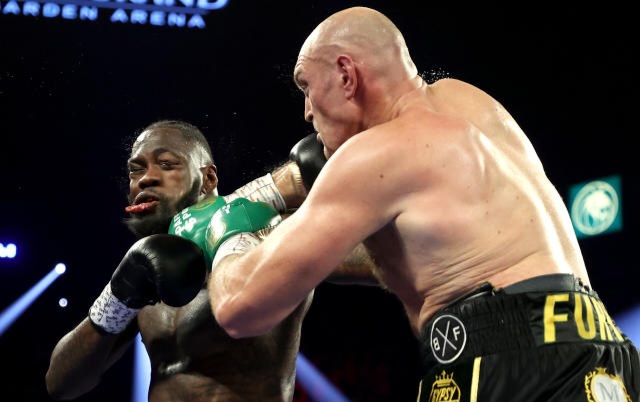 When Tyson Fury isn’t taunting it, or tempting it, or indeed tweeting about it at regular intervals throughout the year, he happens to be surprisingly cogent and insightful on the subject of retirement.
When Tyson Fury isn’t taunting it, or tempting it, or indeed tweeting about it at regular intervals throughout the year, he happens to be surprisingly cogent and insightful on the subject of retirement.
For years Fury has mentioned retirement as a way to grab attention or maintain relevance, but it is only when he sits down and talks about it now, as a man of 36, that his words carry any sort of weight or resonance. He is, after all, coming off his first professional loss – a decision defeat to Oleksandr Usyk in May – and will therefore know that he is just one or two more away from perhaps being forced to retire against his will.
No longer, then, is the prospect of retirement a promotional tool or toy with which he can play and use to distract from other issues. Instead, as he approaches his mid-thirties, retirement is, for Tyson Fury, now something he can see, smell, and taste.
“I’ve been in love with boxing for such a long time – from being a little boy – and I’m probably at the end of my career in the next few years,” he told Dev Sahni of Queensberry Boxing. “It’s been a love-hate relationship. It’s been toxic at times. When it’s good, it’s very good, and when it’s bad, it’s very toxic.
“So I’m in that relationship and I don’t just abandon things. I try and make things work and that’s where we are at the minute. We’ve been in this romantic relationship since I can remember, since I was a child, and now I am a fully grown adult with a family of my own. It’s like, ‘Do I abandon it, or do I not?’ I wanted to walk away a lot of times but it always drags me back.”
Fury, 34-1 (24), should take comfort from the fact he is not alone in this fight. Many boxers, in fact, have tried escaping the sport’s clutches only to be tempted back either because they didn’t make enough money during their heyday, they have wasted all the money they did make, or they cannot bear the silence that greets them when the phone stops ringing and people no longer drop everything to be at their beck and call. For most, it is simply the boredom that gets to them. It is the feeling of having no routine, no purpose, and no sense of identity without boxing. It is the feeling of being just as insignificant now as any other person walking the street; some of whom once paid money to watch you perform.
“It’s like a massive drug and an addiction,” said Fury. “I know it’s an addiction and I’m an addictive person. Boxing is an addiction; it’s not my best friend. It abuses me. When I come in this gym, it abuses my body, my mind, my soul. But afterwards I feel like it takes me to ecstasy. The rush is unbelievable. It gives me the biggest highs ever, but it also gives me the lowest lows as well. Boxing is more addictive than any drug ever. Ever. You can’t let it go.”
One day, of course, he will have to. He will have to let go of boxing and he will, in the process, perhaps then realize why retirement – the very idea of it – is not something that should ever be trivialized or used for anything other than what it is supposed to represent.
By Elliot Worsell
